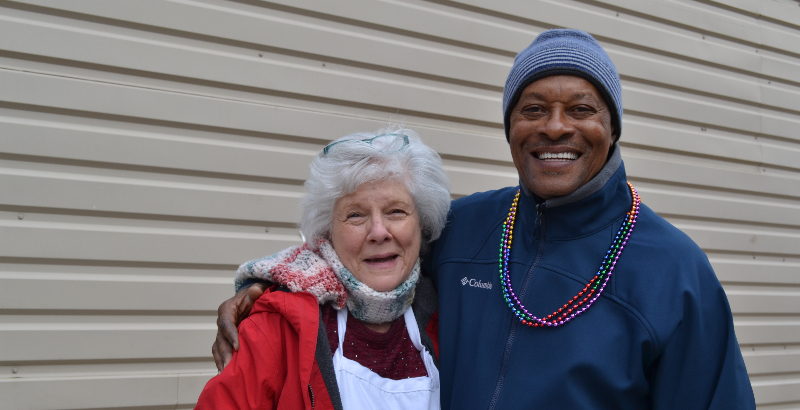On a Tuesday before lunch, I visited the Daily Bread Soup Kitchen, a non-profit organization run by volunteers to feed the food insecure. Ruth Ann Evans, a vibrant volunteer who serves every Tuesday, walked me inside the building on First Street.
The huge indoor space was empty apart from the team of volunteers and stacks of boxes with donated food. There were hampers of fresh produce lined up on folding tables. A team of retired individuals cooked in the kitchen and scooped hot meals into to-go containers. I saw volunteers smiling as they lifted gigantic pots and washed dishes in the back. Where once there were a hundred diners inside the building, there is now a smooth system of providing hundreds of meals packaged to-go.
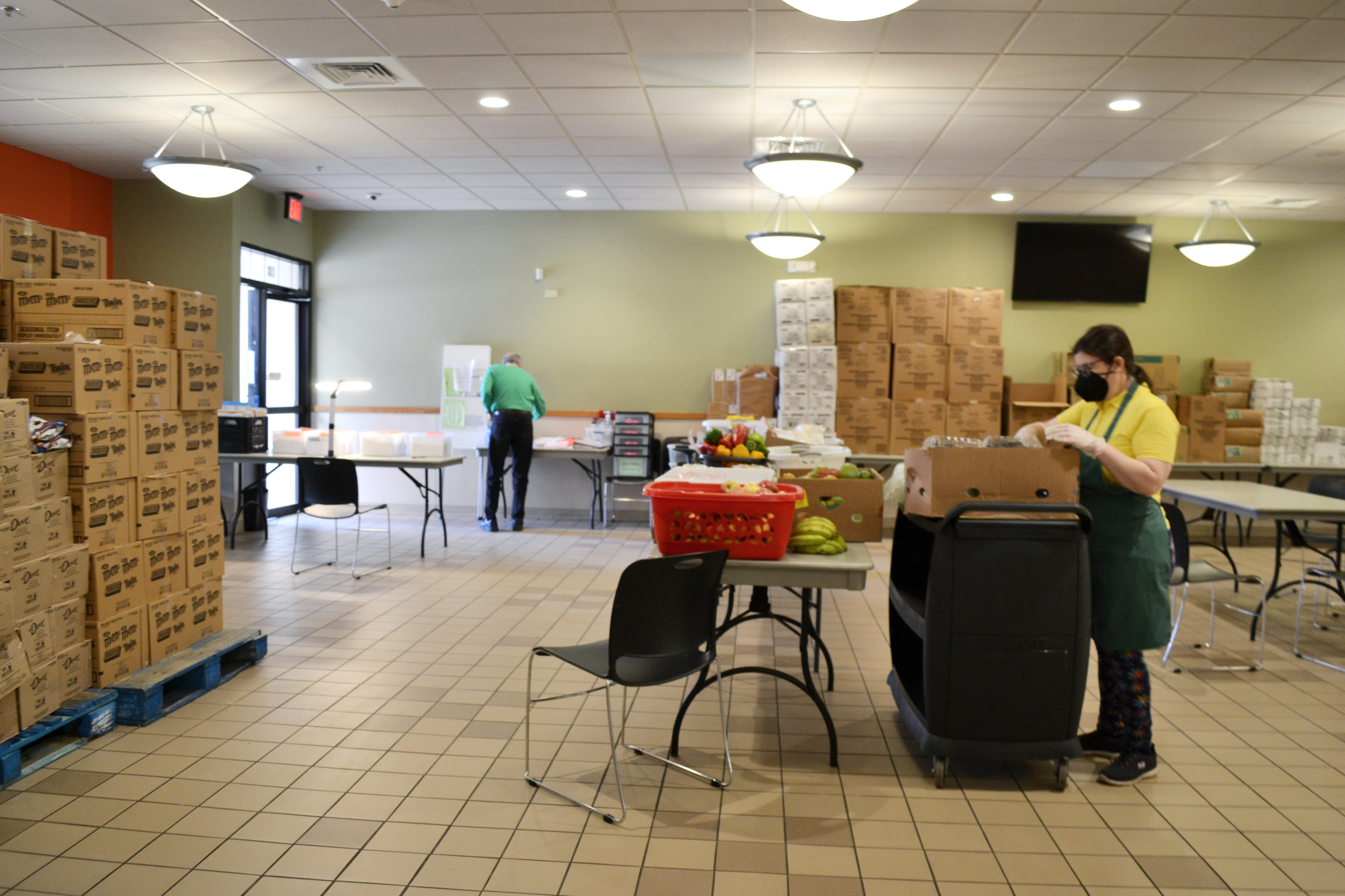
Photo by Alyssa Buckley.
Ruth Ann showed me around, introducing me to each person on the Tuesday crew. Many wore aprons or masks with “Awesome Tuesday” written on them. A retired math teacher stirred 25 pounds of coleslaw, and a retired English teacher showed me how the rice is made.
I wanted to learn more: How many people did they serve? How did they decide the menu? Did things change with the pandemic? But, I didn’t even need to ask my questions. The amiable Ruth Ann was happy to share about all the work being done by the Daily Bread Soup Kitchen; she talked about the soup kitchen’s origin, the 300 free hot meals served everyday, and how — even in the pandemic — the Daily Bread Soup Kitchen never closed and was able to keep serving daily meals.
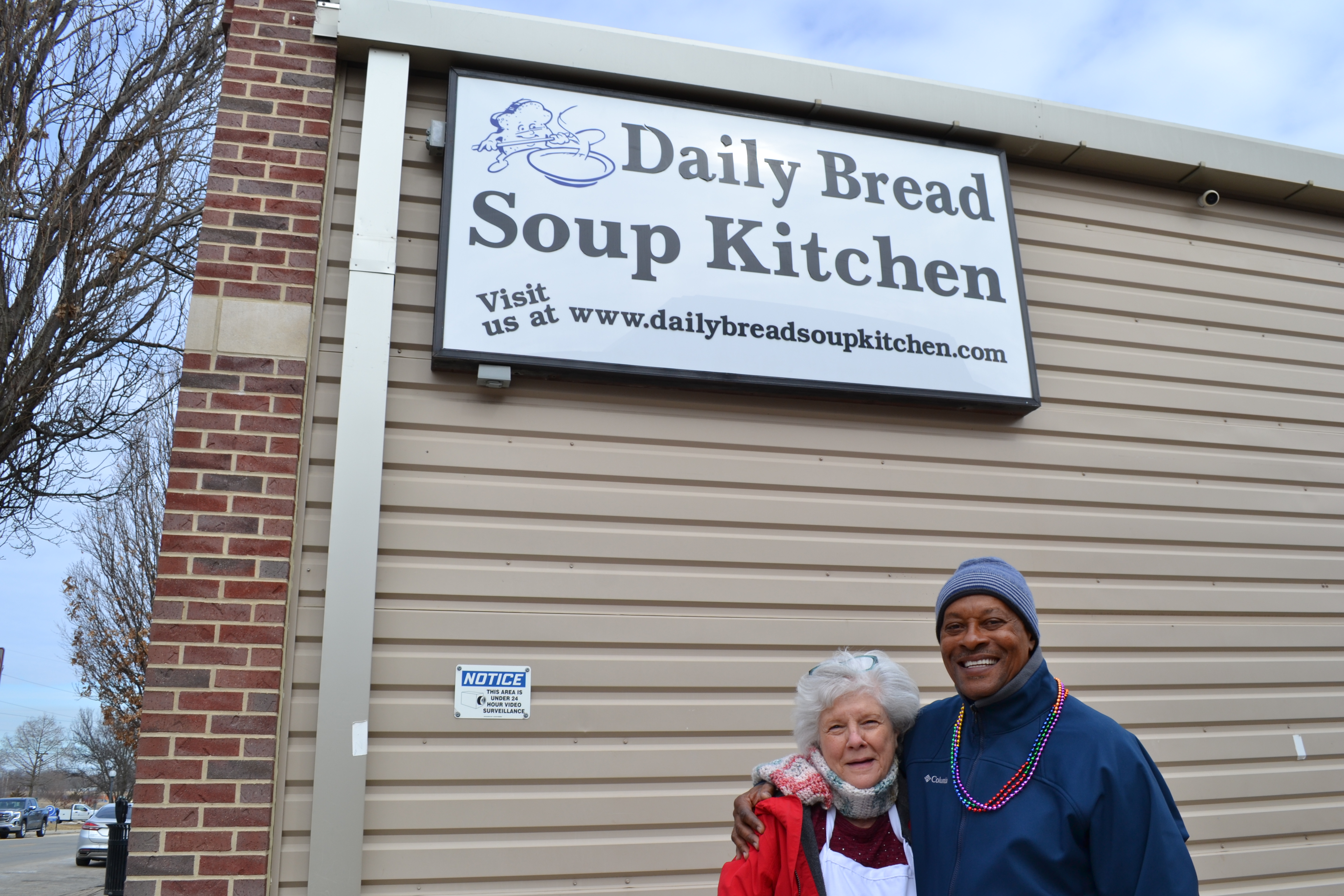
Photo by Alyssa Buckley.
Smile Politely: Thanks for having me at the Daily Bread Soup Kitchen today, Ruth. How did this all start?
Ruth Ann Evans: This is an offshoot of the Catholic Worker House that used to be on Randolph. The idea of feeding people or addressing the inadequacy of the community has been going on since the eighties. We were over at New Covenant for awhile because we had so many people, people that were coming. In 2016, we opened this. We could serve more people, and we could own this place.
So we’re all volunteers. There is no paid staff. It’s been that way since the eighties. We all volunteer. We are primarily older, retired people. All us gray-haired volunteers, [laughs] we have been doing this for a long time, so in the pandemic — and this is Charlie Brown.
SP: Hi, Charlie! Nice to meet you.
Charlie Brown: Hi, how are you doing?
Evans: He works outside. We found that we really need someone — and he’s been an invaluable help to us. He is somebody who, you know, makes sure people wear masks, social gathering — things are a lot better in that. Now people are vaccinated.
Brown: Yeah, things are a lot better. You know how it is with change. People and change. Like, I’ve been doing this for thirty years, put a mask on? So, there was a lot of resistance in the beginning.
Evans: But things are better now.
Brown: Yeah, things are a lot smoother.
Evans: Because, see, we served on a Sunday when the Governor closed everything down in March 2020, and I think that was maybe the 22nd. That Monday, we started carryout. We never missed a day.
SP: Wow! Not one day?
Evans: Nope. Not one day. The Governor closed. Public Health came over the weekend, and we determined how we were going to do this. We’ve never missed a day. On Sunday, it was dine in, and on Monday, it was carryout. We never quit serving.
And we never missed with the snowstorms, either. They served over 200 meals on the snow days. The snow did not stop people coming to get food.
Brown: I’ve got to go help open —
Evans: I’m sorry, yes. Thank you, Charlie.
SP: Nice to meet you, Charlie.
Evans: And so, we have never missed a day. When we were serving inside, we could do about 100 or 110 — maybe 120 people could come inside. We served an average of about 200 people in a day. Now that we’re doing carryout meals, we’re up to about 300 meals a day.
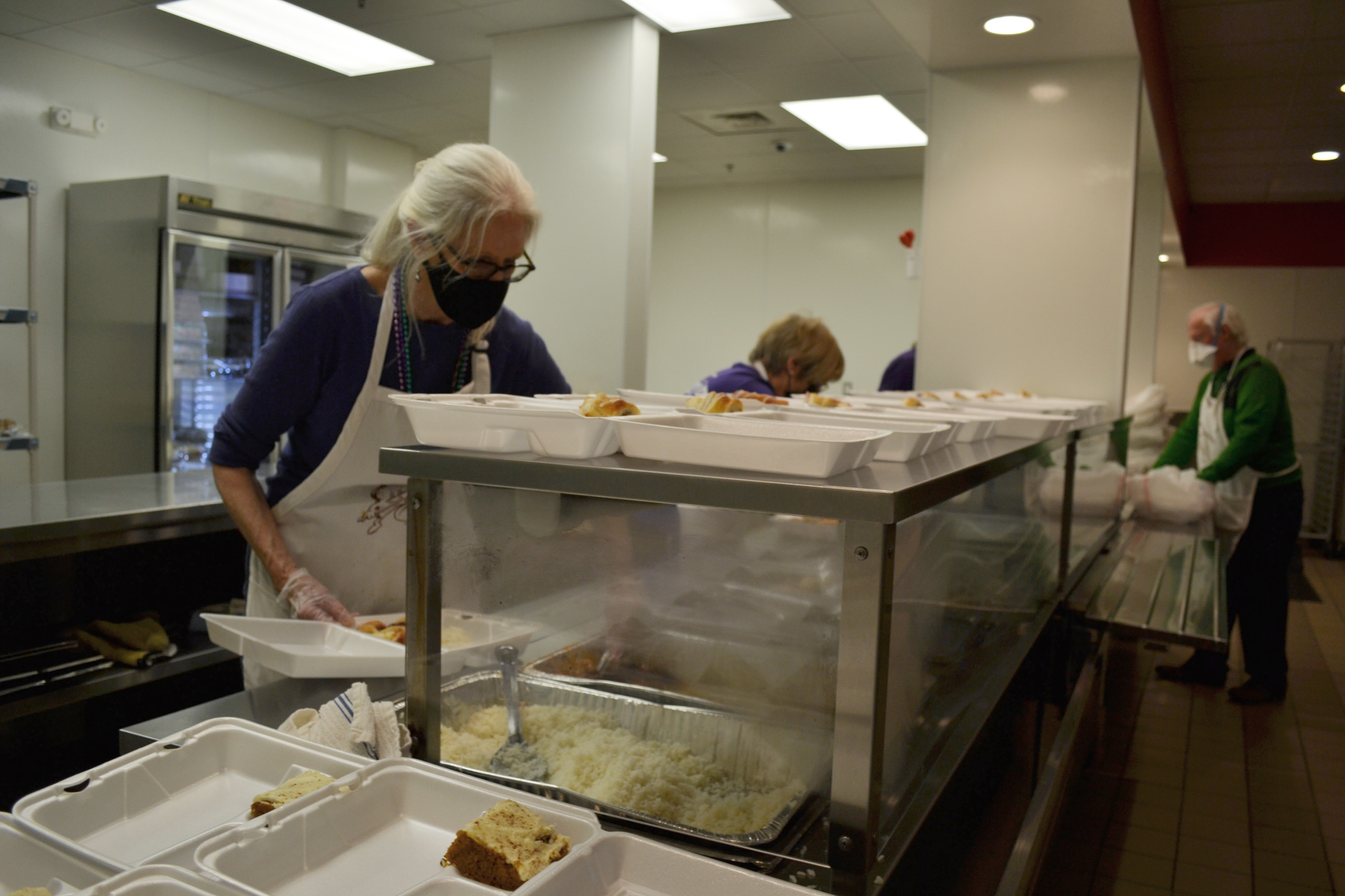
Photo by Alyssa Buckley.
And the people are coming. I think we’re serving another population; people are taking meals back. We’re giving meals to people at C-U at Home. People are taking meals back to shut-ins, to different family members. People that can get out are taking meals back to other people.
SP: That is amazing.
Evans: Because you know, you’ve got to wait in line. You will see people lined up. People are going to start lining up soon. What we’re really seeing are those without an address, the transient, you know.
We give out a hot meal and a sack lunch. We use a biodegradable clamshell because we’re trying to be environmentally friendly. When the weather warmed up in 2020, it was so hot for people. All the water fountains were closed. We started giving out bottled water.
SP: Wow, that’s smart.
Evans: Yes, anyhow, people get a sack lunch to-go.
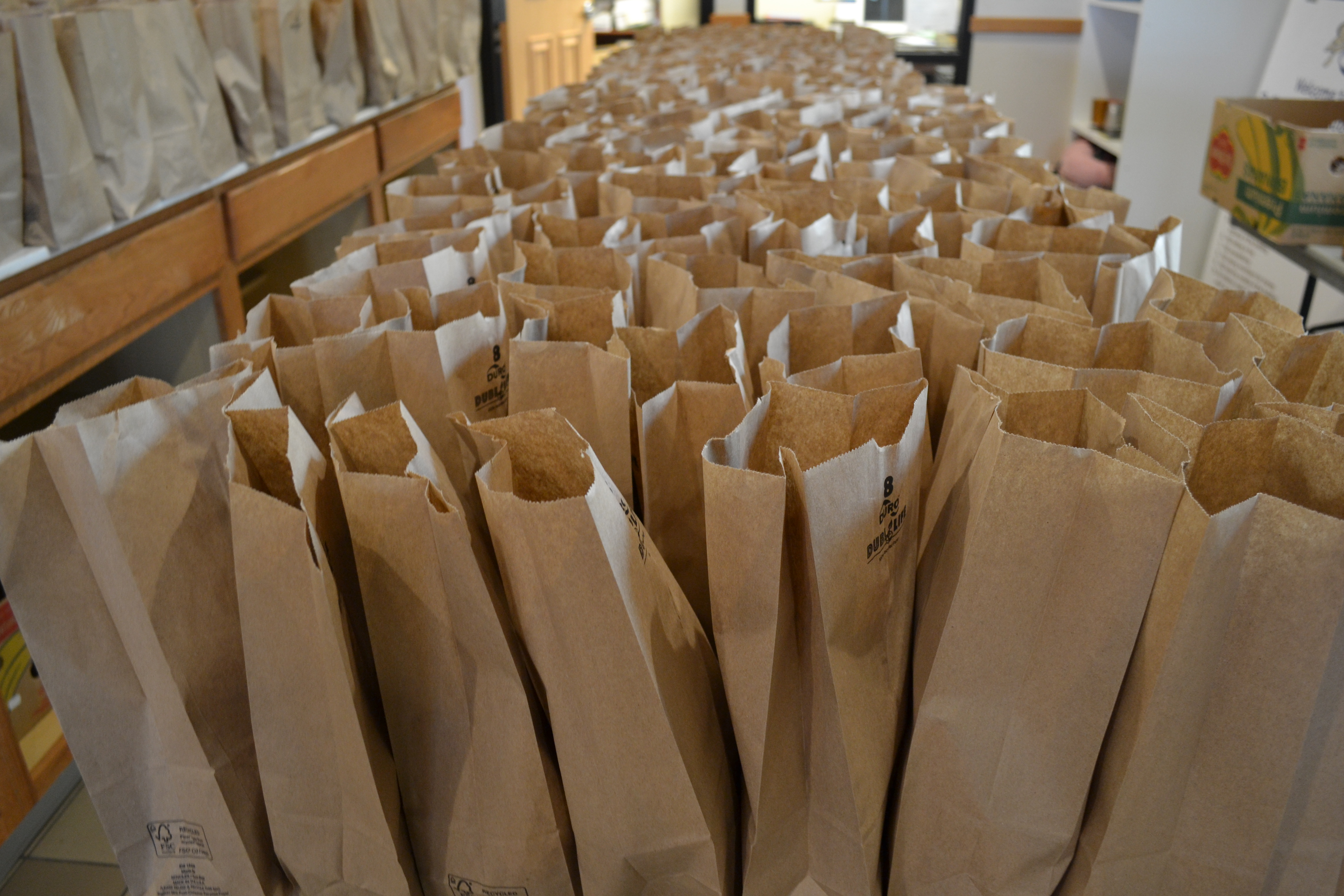
Photo by Alyssa Buckley.
Since the pandemic, we’ve been buying better grades of meat. We have sliced ham, turkey, and beef, so people have protein. We have peanut butter and jelly. We get food from the Eastern Illinois Food Bank. Somebody goes every day Monday through Friday. We also go to GFS.
SP: What’s GFS?
Evans: It’s Gordon Food, by the mall, but the grocery stores all send stuff, too.
SP: Really? Like Harvest Market? Common Ground?
Evans: Oh yeah, we get stuff from most grocery stores. Common Ground, what Common Ground does for us — we got a sizable check from them. We’ve been January, for awhile, in their round-up, so we’re involved with Common Ground. United Way, we get resources from that, too.
We take no federal or state grants. Any kind of money we get is through donations.
SP: Local?
Evans: Local. The community is very generous. Some of the local — like the Rotaries, United Way, Common Ground, they’ve contributed to us.
SP: Do individuals have an opportunity to donate or just organizations?
Evans: Oh, yes. We have people donate every month. We have people donate every year. We have people make sizable donations when they die. We have been around for a long time.
SP: Yes, a long time, but to me, it sounds like you’re doing good work here, too.
Evans: Yes, well, feeding the hungry. And, there’s no administrative cost. Look at this.
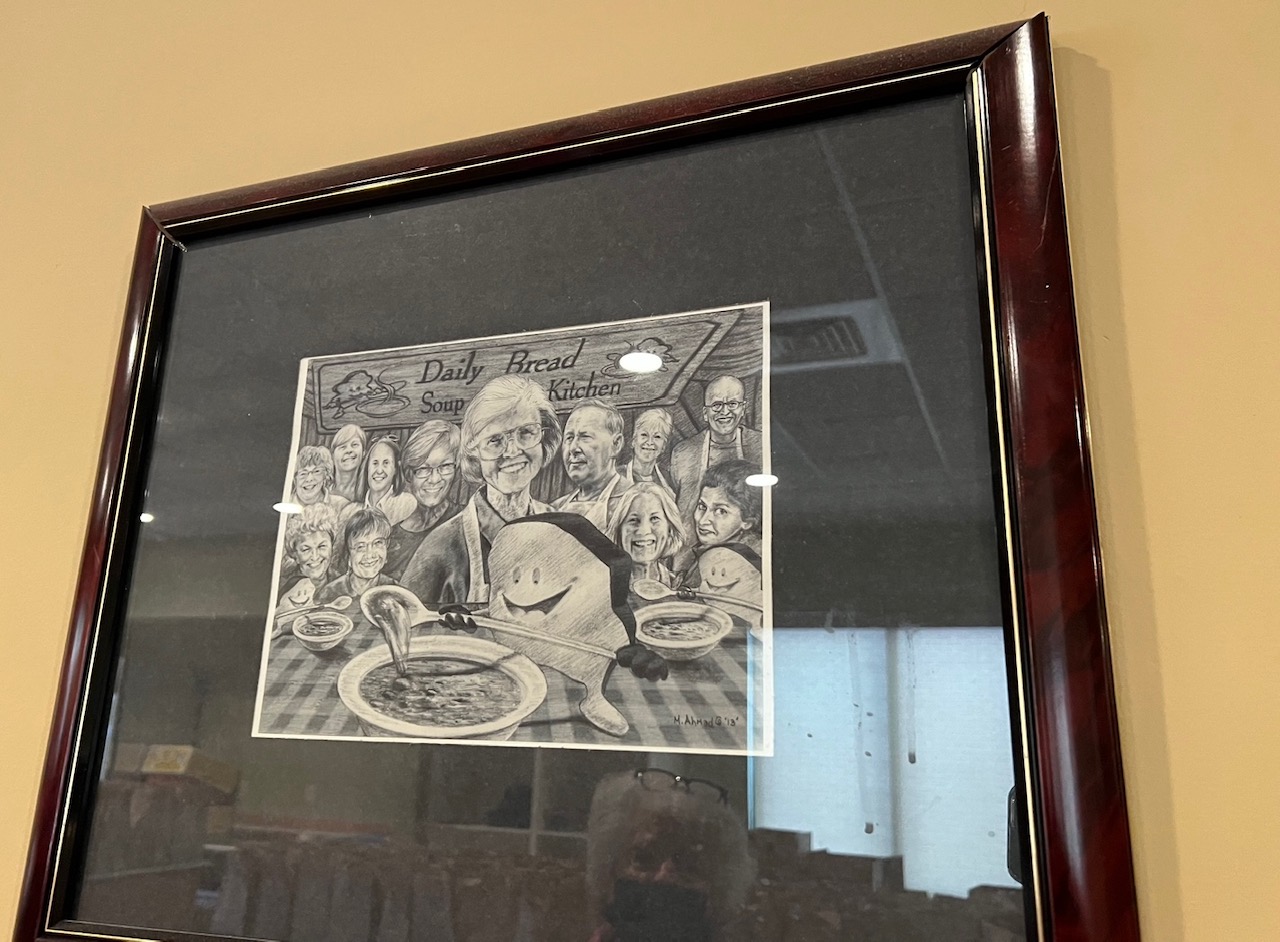
Photo by Alyssa Buckley.
The woman in the middle there is Ellen McDowell, and she’s 97 now. She really started all of this.
SP: Is she still in Champaign-Urbana?
Evans: She still lives in Champaign. She’s still very with it. I talk to her a lot. She founded this, really in the spirit of Dorothy Day. I don’t know if you’re familiar with Dorothy Day. Dorothy Day was an activist in the 1940s and really committed to helping the poor. And Ellen, is of that mind. Ellen started this.
SP: Started by a woman! I love that.
Evans: Yes, she started it in the eighties in Catholic Worker House. Now we’re non-denominational. We have people of all backgrounds.
SP: So it’s non-denominational, but is it still a religious organization?
Evans: Well, it’s the Daily Bread Soup Kitchen. We have had people who are aren’t involved in religion. We have people who are Jewish, don’t believe in God. People come here not because of religion.
People who come here are united in their commitment to address hunger in our community. People who really are committed to that, they believe that by addressing hunger — Ellen believes by addressing hunger, you’re addressing crime, too. Because people who are fed think better, can make better decisions. That’s our real goal, and that’s what unites people. Not the religious background. It’s: feed the hungry.
It’s simple, isn’t it? Feed the hungry. We live in a community where a lot of people have resources, and if they can’t give of their time, they give of their resources. That’s what keeps this going, that support from our community.
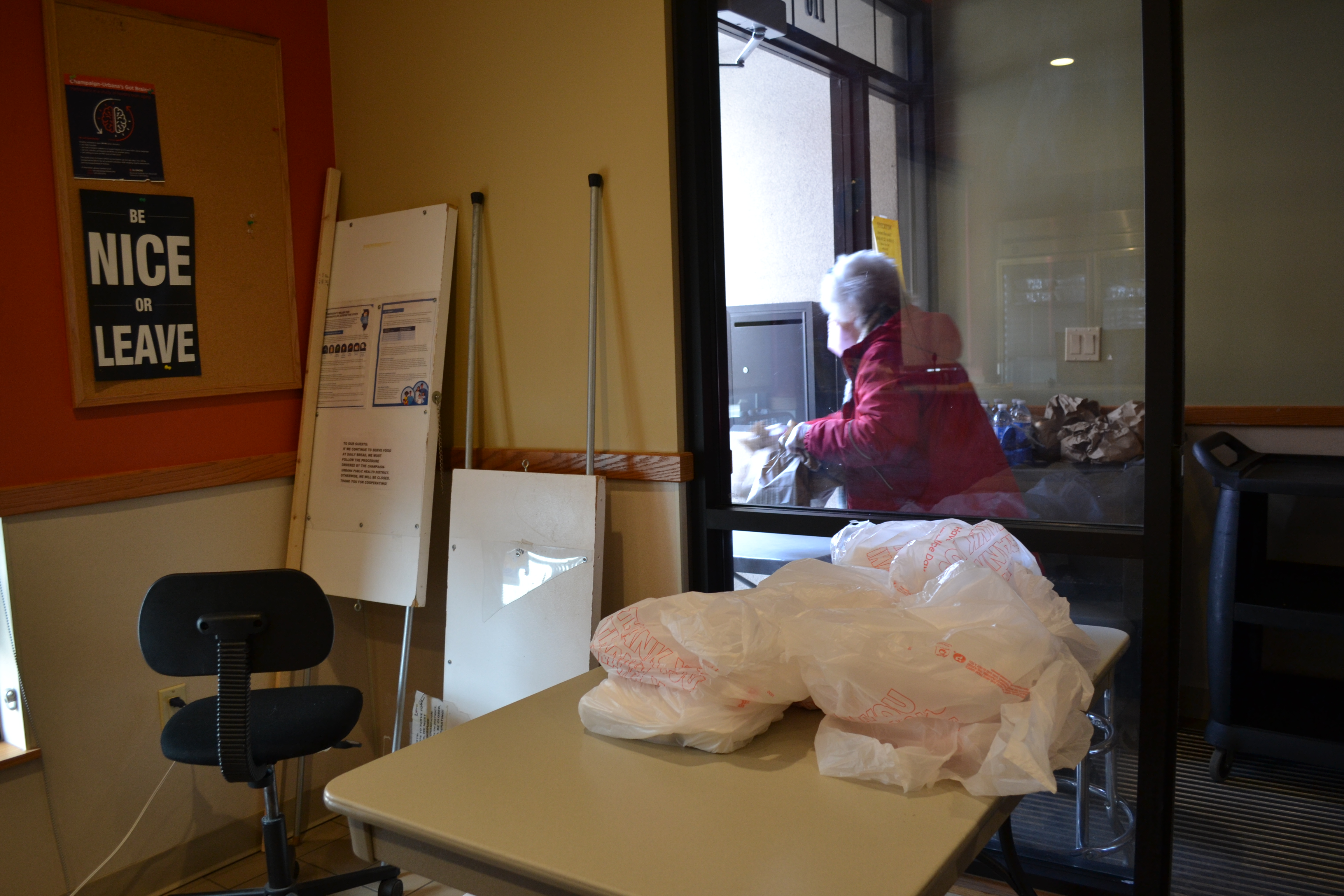
Photo by Alyssa Buckley.
SP: That’s amazing. I am surprised to hear it’s all locally funded, that there are no federal or state funding.
Evans: Nope, we’re funded by donors who are so generous. We’ve got local organizations that are generous, too.
Okay, so let me walk you around. On Tuesdays, Charlie gives out vegetables and fruit. Not all the days do, but we really make an effort, the Tuesday group, to get fruit and vegetables in here.
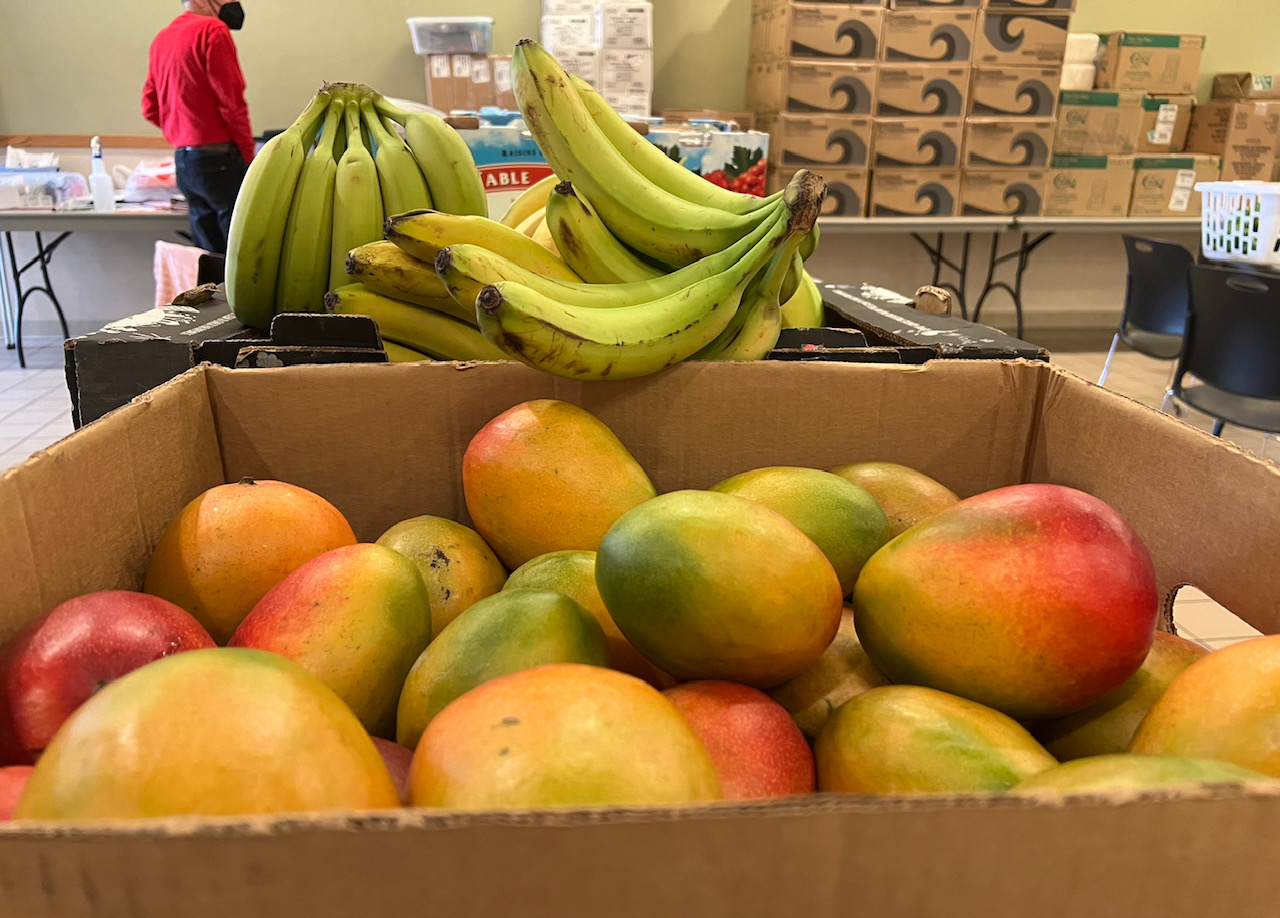
Photo by Alyssa Buckley.
SP: So will these be passed out today?
Evans: Yes, and somebody will come and help him. And help with the mail. Now, 240 people get their mail with us, use our mailing address. Either they have no address or they’re transient. See all this?
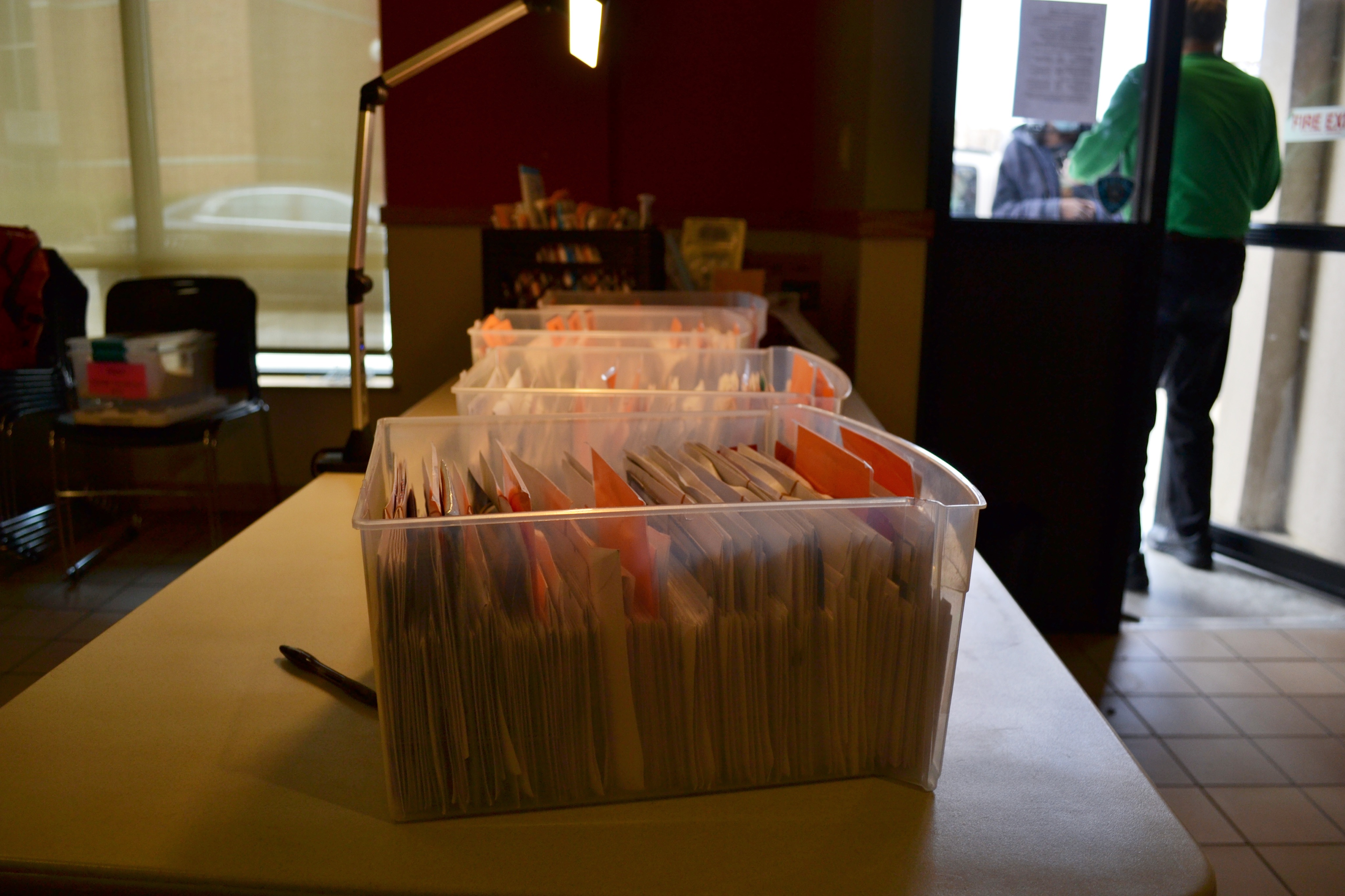
Photo by Alyssa Buckley.
SP: That’s awesome that you provide a safe place to hold mail.
Evans: People move a lot, and they don’t have to worry about mail. We give out mail everyday. On Tuesdays, it’s fruit and vegetables, too. This is when we, you know, have a lot of people, especially more mothers.
Vegetables and fruit are so expensive, and it’s hard to access the grocery store. The food comes from either food banks or volunteers that go to the grocery store to gather the fruit and vegetables. The volunteers bring in stuff, and this is what we give out.
SP: There’s avocados and pineapples, and lots of fresh produce. This is great.
Evans: When we were open, this space was all filled with people getting in line to eat or sitting down or getting fresh coffee. We don’t do coffee since the pandemic, so two years, we haven’t.
SP: Do you think the Daily Bread Kitchen will return to in person?
Evans: We hope to reopen the inside for guests. We are very involved with Public Health. We will check with Public Health when we think it’s good. We worked with them for carryout at the beginning of the pandemic, so we’ll figure it out together.
Let me walk you over here. Here, they are serving up the hot meals. They’re getting ready to hand these out.
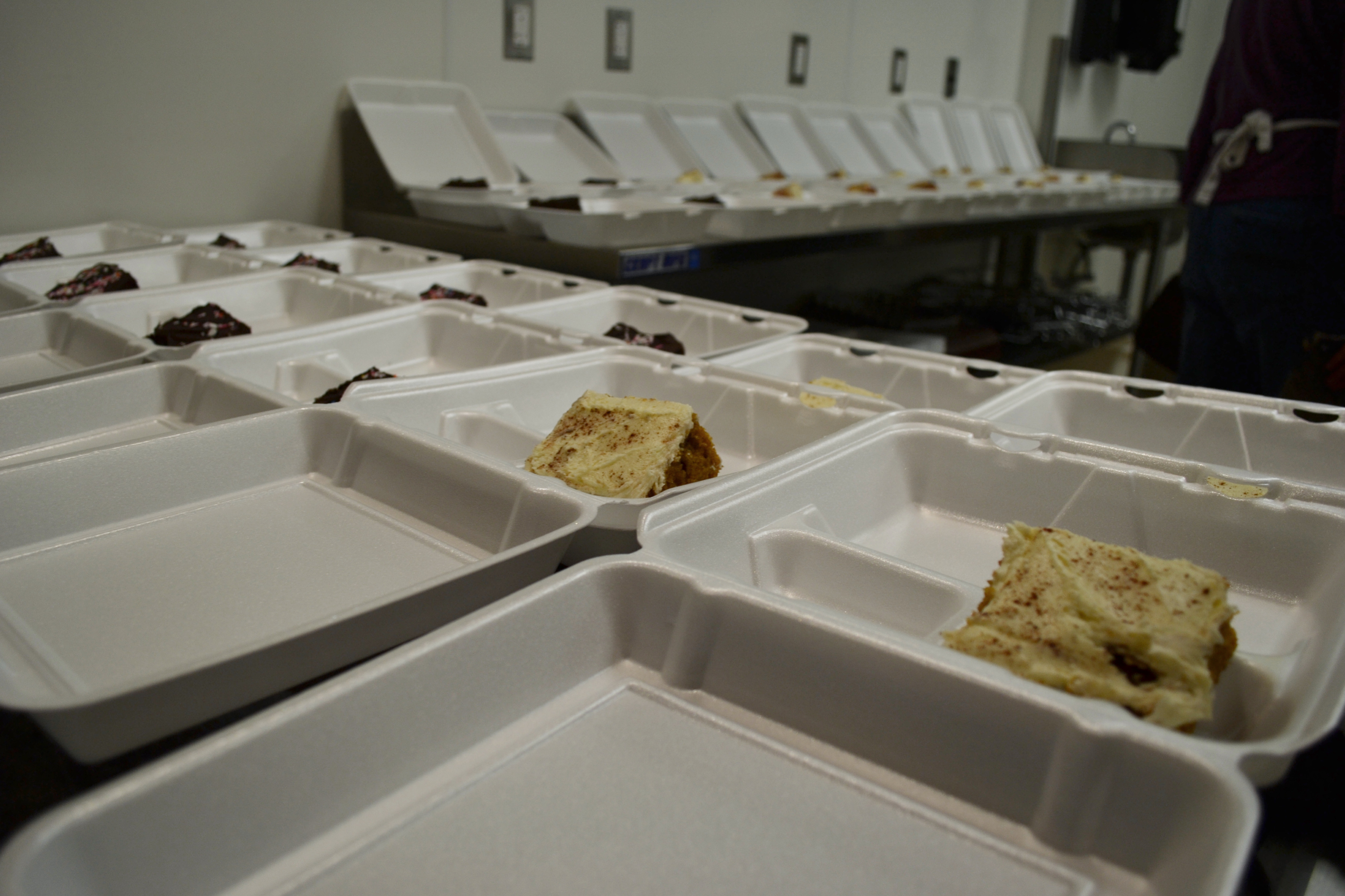
Photo by Alyssa Buckley.
And here’s the desserts. They always have a dessert.
SP: Where do you get the desserts?
Evans: Well, the food banks. Grocery stores. Panera, too. That’s from the U of I.
SP: It looks so yummy!
Evans: Let me show you back here in the kitchen.
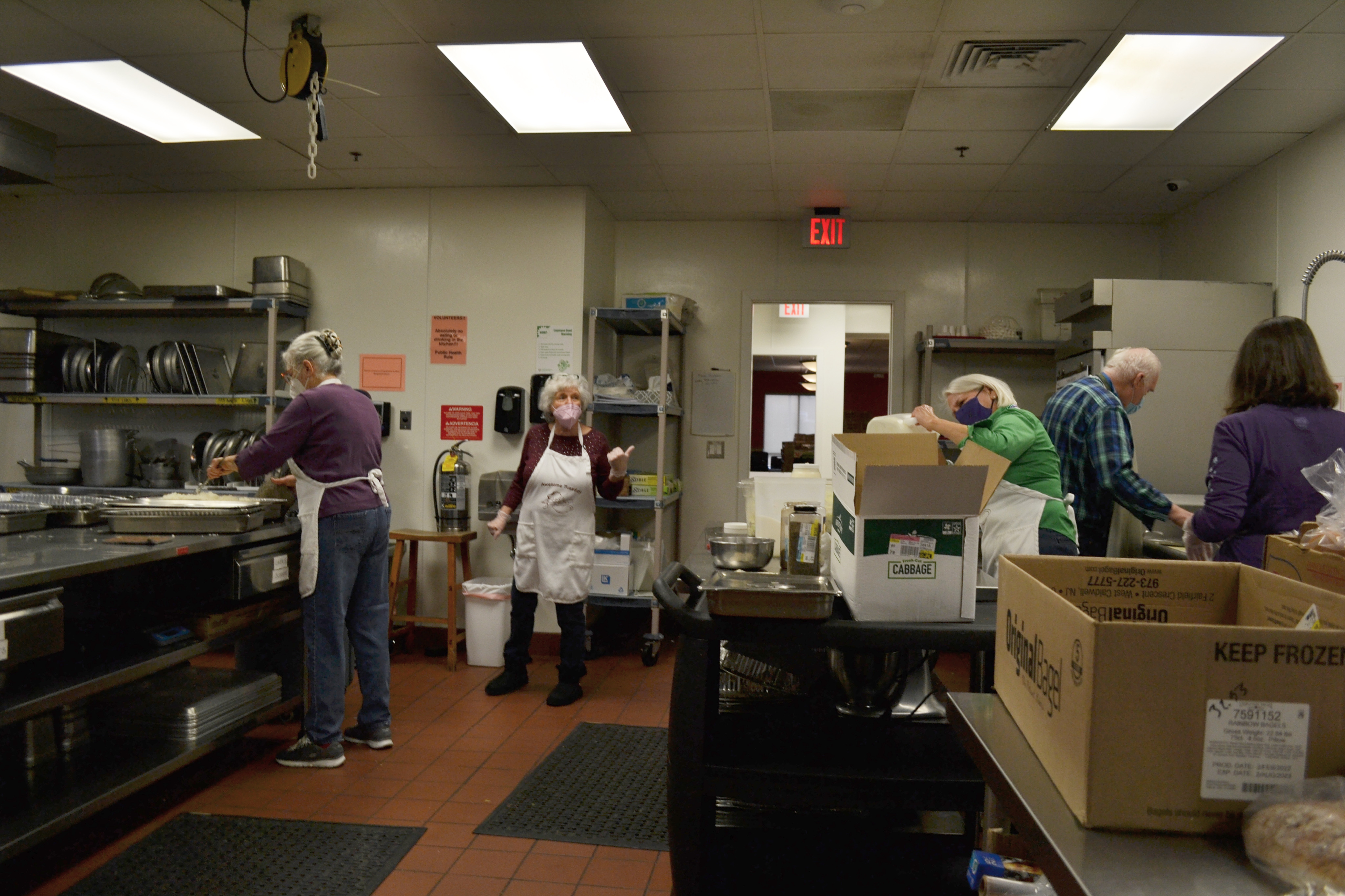
Photo by Alyssa Buckley.
Over here, they’re making red beans and rice for today.
SP: Wow! That is a lot of rice!
Evans: They come in early to make it. We’re planning to serve 300, so it has to be a lot. You are all here by 7?
Volunteer: Right, if we haven’t started by 7:30, we’re late. We came in yesterday to soak the beans and cut the peppers. There’s a trinity in Cajun cooking: onion, garlic, and peppers. We cut them up yesterday.
SP: It looks so good.
Evans: She’s making the coleslaw. We’re going to go through a lot of coleslaw today.
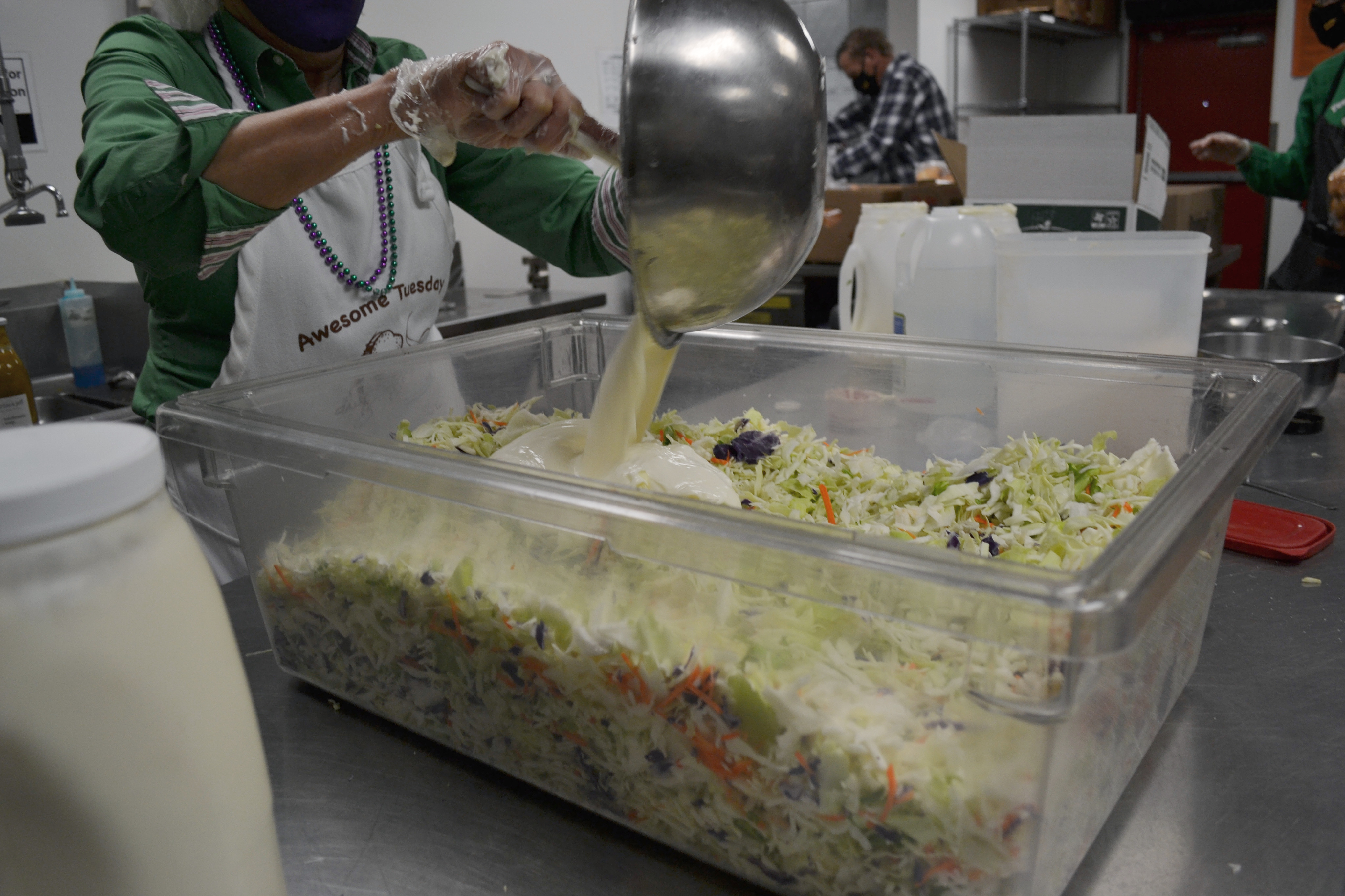
Photo by Alyssa Buckley.
Volunteer: Look at this! I finished another 25 pounds of coleslaw.
SP: 50 pounds of coleslaw for one day?
Volunteer: Yes, and I’m poised and ready to make another batch if someone tells me to.
Evans: Here’s some food storage. These volunteers are putting food away. We own the building next door, too, now, so we can store food and stuff. At Christmastime, we give out — we used to call them backpacks, but now we call them knapsacks. Knapsacks with toiletries for everybody, deodorant, soaps, gloves — gloves are a big deal, scarves, hats, and toiletries.
SP: Who is in charge of the menu for each day’s lunch?
Evans: Each day has a food team. These are our head cooks, but each day decides what they’re cooking. It’s based on what’s here. Just to give you an idea, here’s our refrigerator, and then the freezer is over here.
SP: Wow, those are huge.
Evans: And we’ve got a walk-in freezer. We used to have soup —
SP: That probably does not take out well.
Evans: Right, so after two years, we are hoping to reopen and work with Public Health and have some soup.
SP: The menu looks delicious.
Evans: And I’ll walk you back here. I’m going to have to start serving soon, but I want to show you this dishwashing area.
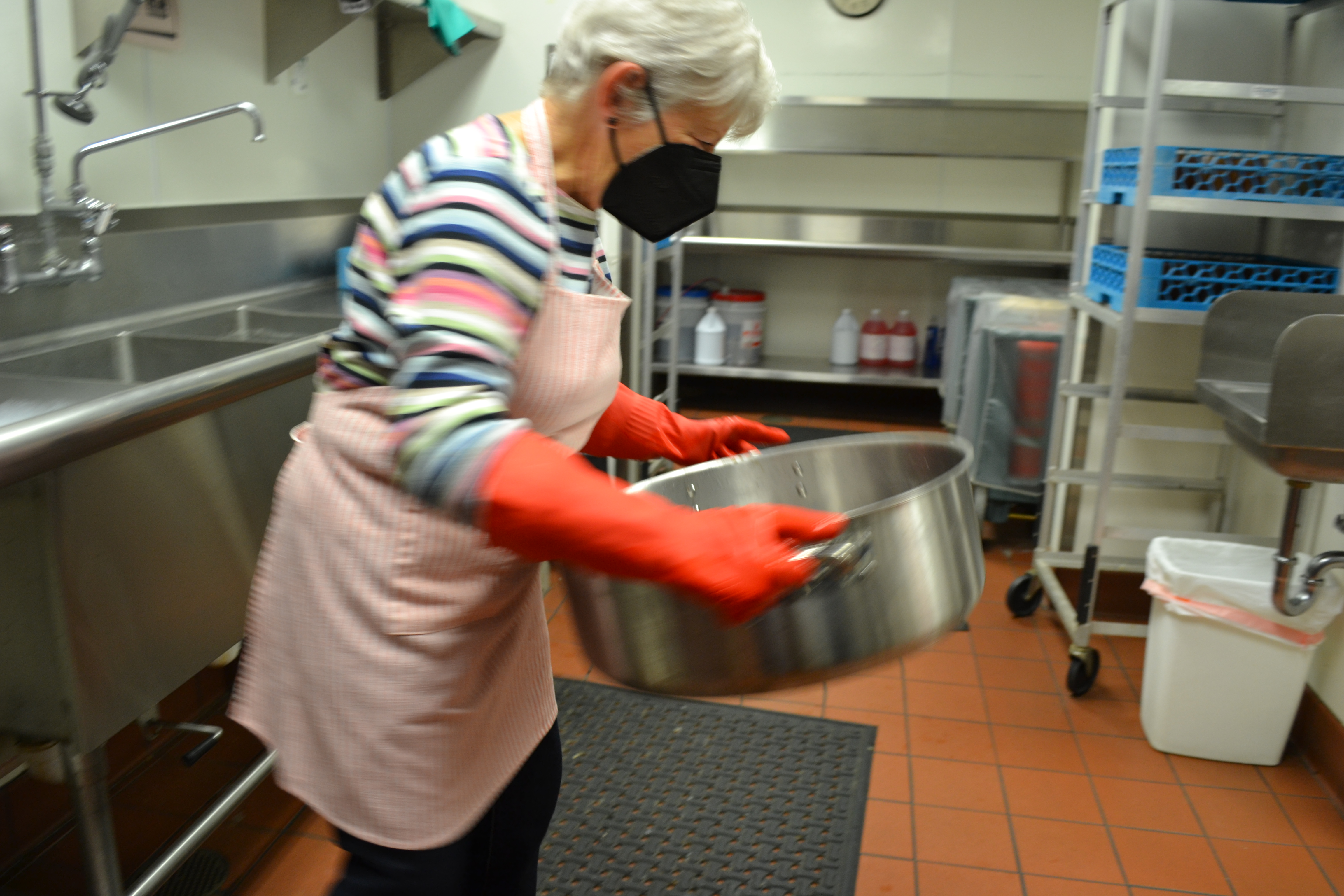
Photo by Alyssa Buckley.
This is — you know, we used to do a lot more dishes, but with takeout, not so much.
I have to start serving. We’re going to start with 25 meals ready to go by the door. Here’s Charlie, too.
Brown: We always have a line. Usually, we have a long line wrapped around this building. We’re always busy. We’ll give out hundreds of meals a day.
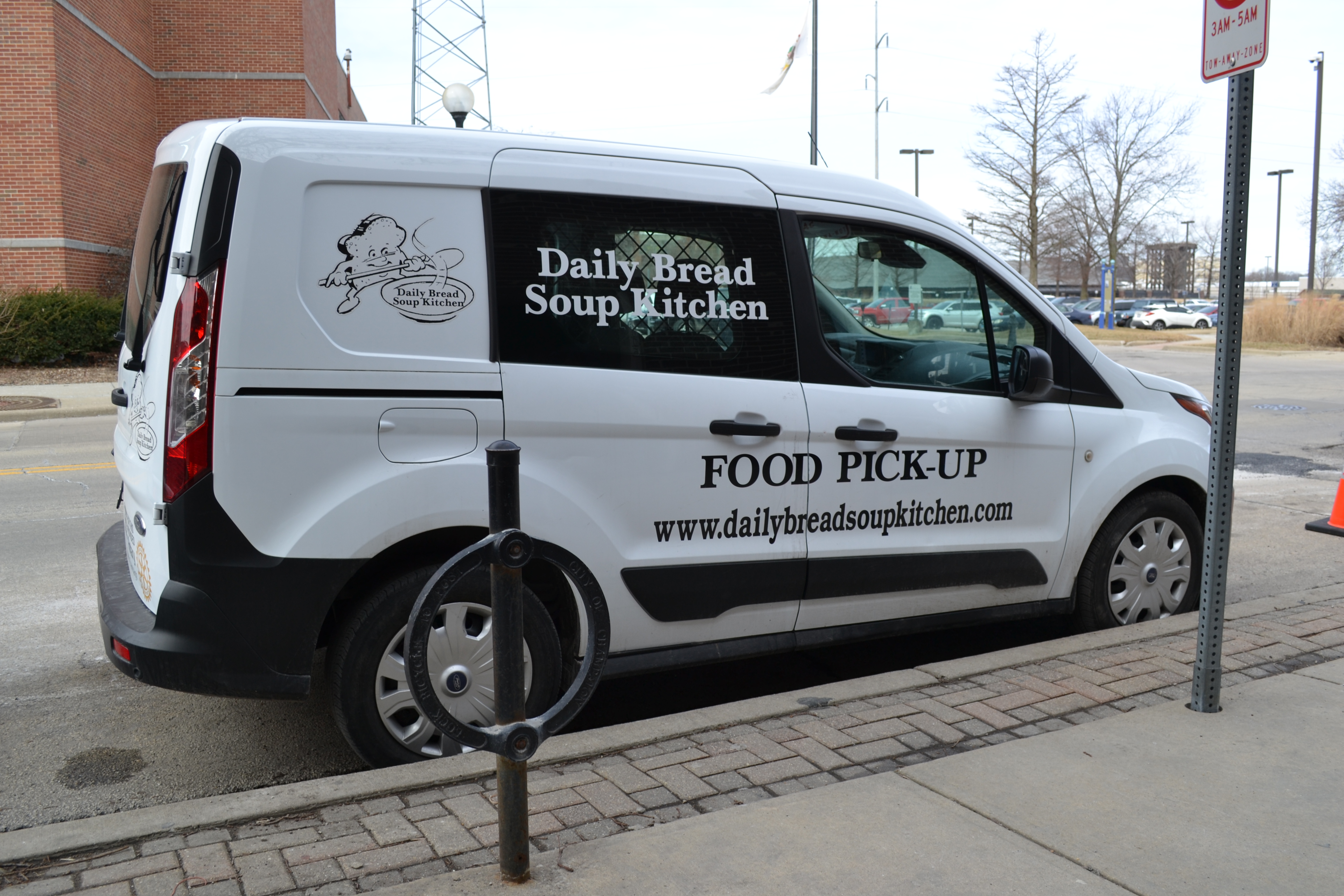
Photo by Alyssa Buckley.
Nice to meet you, too, Alyssa. Ruth, I’ll be back. I need to deliver these meals.
Evans: Those meals go to C-U at Home. I need to go back and help, but I hope you got enough for your article. I’m going back in to serve, but thank you for coming out.
SP: Thank you for having me.
Ruth Ann Evans immediately jumped into her familiar role as volunteer when the clock read 10:29. She knew everyone who came to the window for a meal.
She recognized one man and said, “Hold on, seven, right? Get him seven please.” She asked diners, “You want one for your mother?” Clearly familiar with the guests, she knew chatted with them by name as she handed out meals to-go.
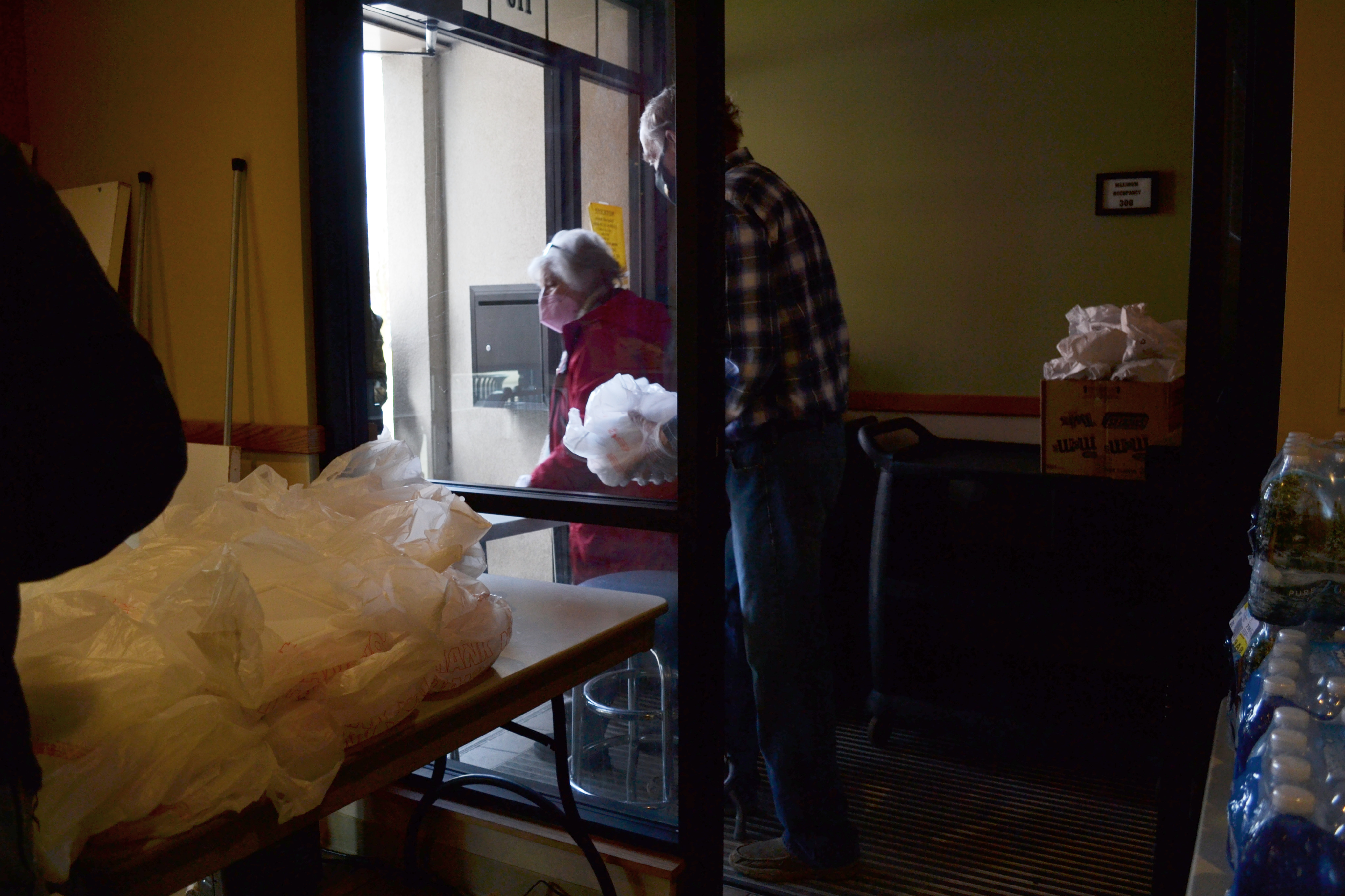
Photo by Alyssa Buckley.
Diners at the Daily Bread Soup Kitchen do not need to sign up in advance to receive meals; just show up. Volunteers shared with me that sometimes U of I grad students will come. One volunteer told me that sometimes people have a job but want to stretch their paycheck as far as they can. Having to buy clothes, rent, and gas is a lot, so cutting the food budget can really make a difference. The Daily Bread Soup Kitchen is happy to serve anyone; anyone who comes gets food.
If you are interested in becoming a volunteer, the organization welcomes “those who share an unconditional positive regard for every human being” and wants to help serve lunch in “a safe, inviting environment with an atmosphere of hope and dignity.” Fill out the volunteer form here.
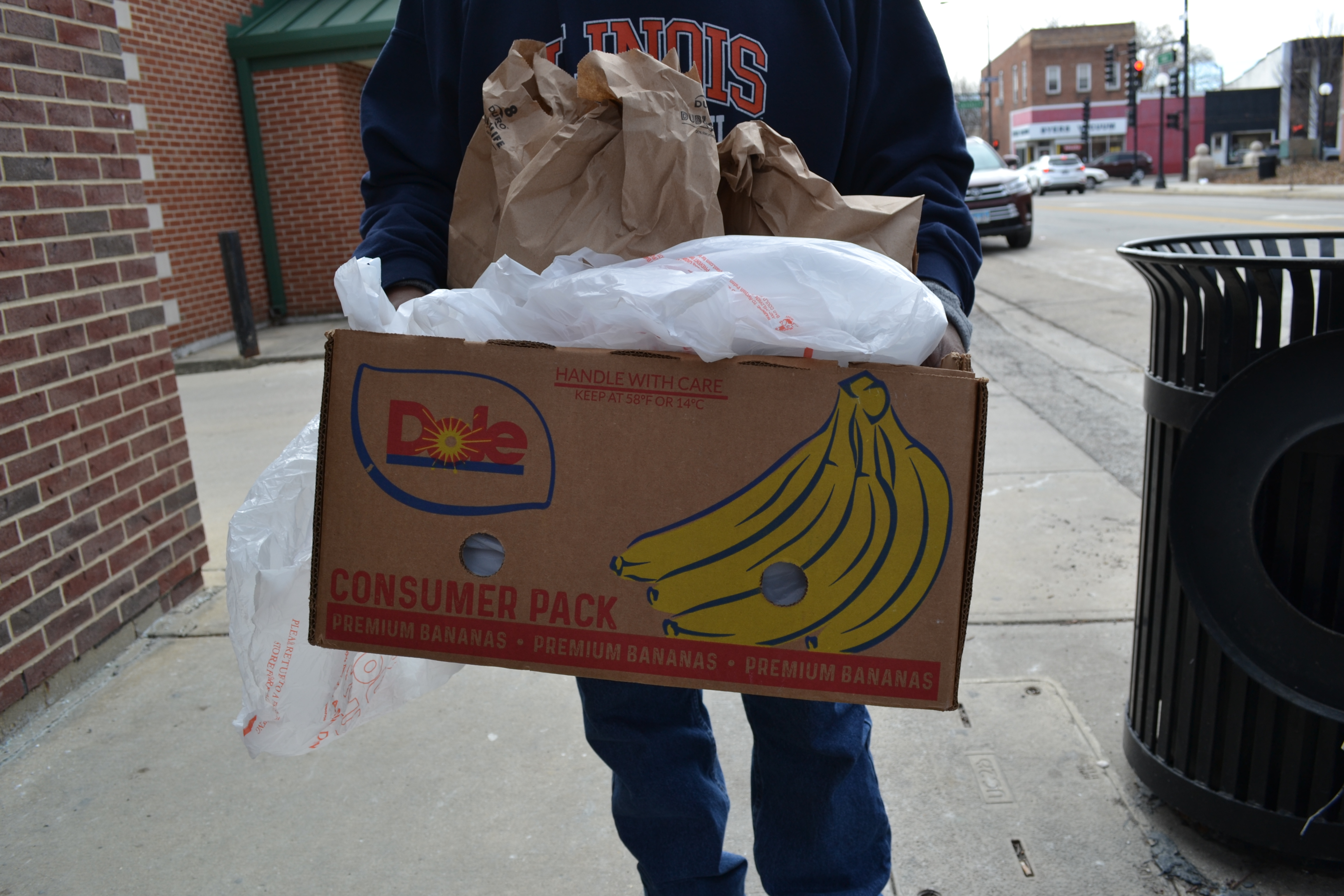
Photo by Alyssa Buckley.
The Daily Bread Soup Kitchen accepts donations if you are interested in donating. In addition to donations from individuals, the organization receives food donations from several local businesses, groceries, and restaurants including Black Dog, Betsy’s Bistro, Hendrix House, El Toro, Piato Catering, Harvest Market, Starbucks, Panera, Arby’s, and more.
Daily Bread Kitchen
116 N First St
Champaign
10:30 a.m. to 12:30 p.m., daily








